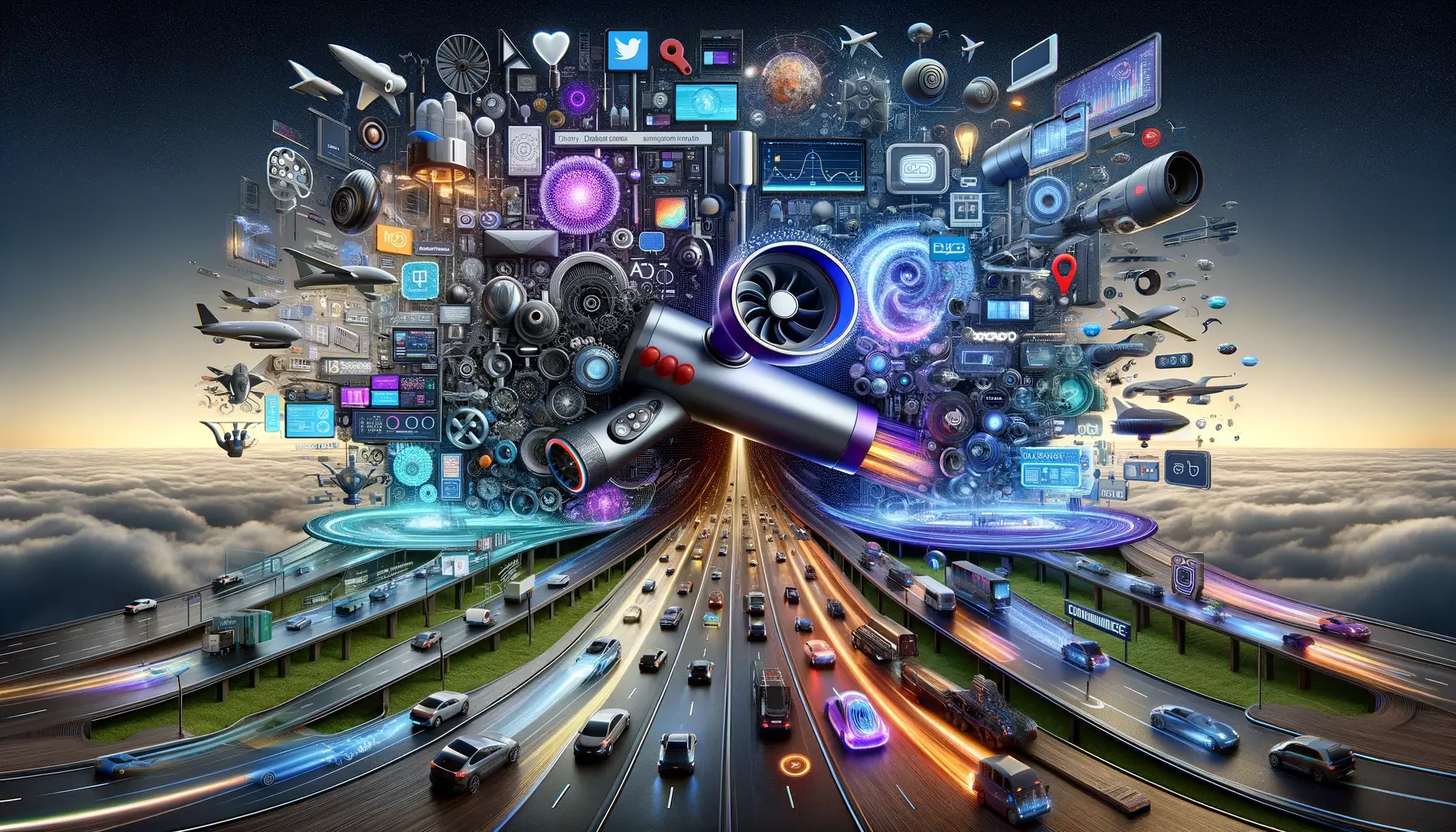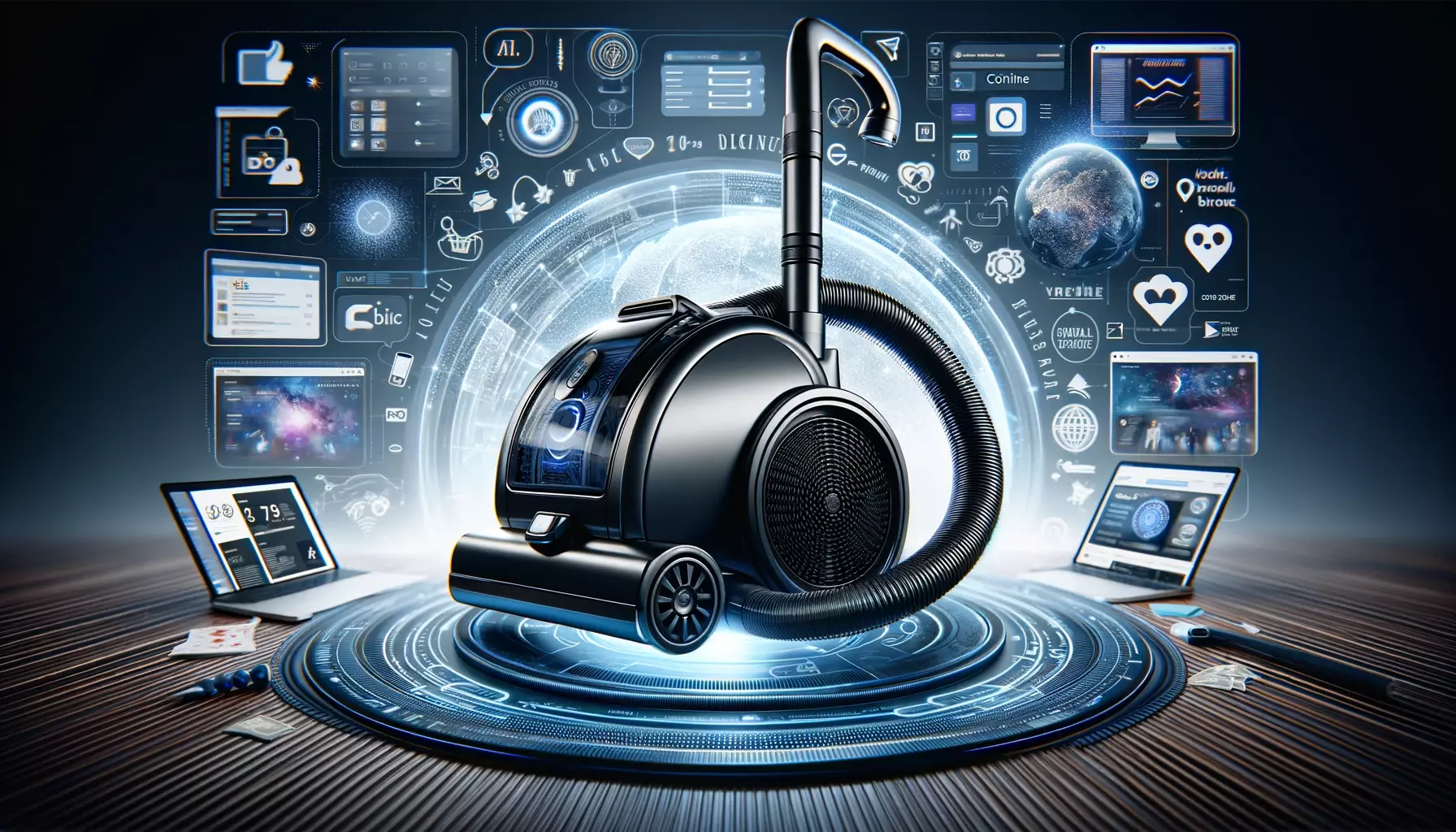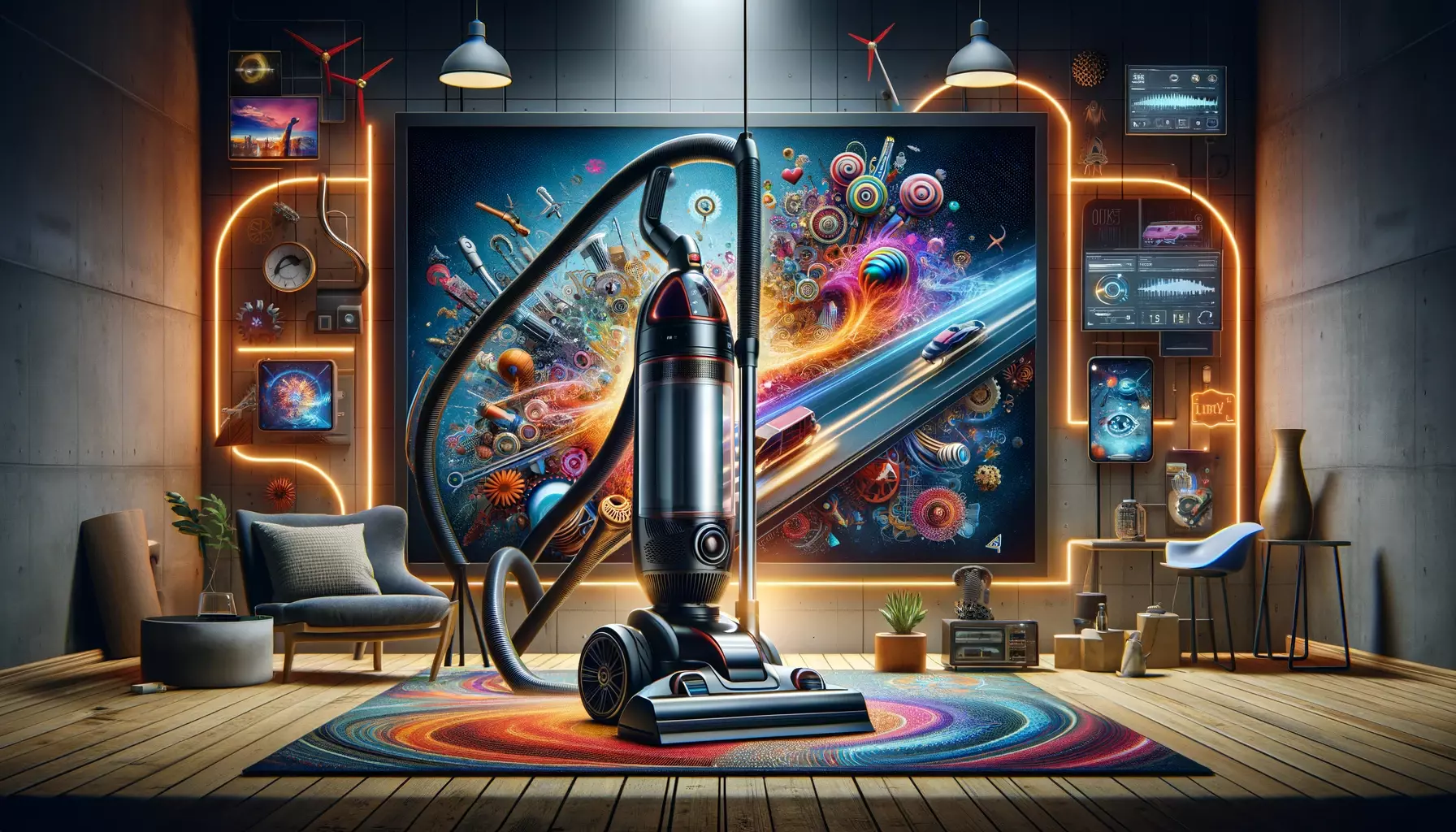Dyson's marketing strategies are built around its core strengths of innovation, premium branding, direct sales, and problem-solving design.
By focusing on these areas, Dyson not only distinguishes itself from competitors but also builds a strong, loyal customer base that values quality, performance, and design.
What is Dyson’s Core Marketing Strategy?

The core marketing strategies of Dyson focus on innovation, premium branding, direct-to-consumer sales, and problem-solving design.
These strategies highlight Dyson's commitment to creating and marketing products that stand out in the home appliance industry for their technology, design, and performance.
Innovation as a Brand Hallmark
Innovation is at the heart of Dyson's marketing approach. The company invests heavily in research and development to create products that offer new and improved functionalities compared to what's available in the market.
An example of this is the Dyson Air Multiplier, a bladeless fan that promises efficient airflow without the buffeting caused by traditional fans.
Premium Branding and Positioning
Dyson positions itself as a premium brand, focusing on the quality and technology of its products rather than competing on price.
This is evident in its advertising and product design, which emphasize superior performance, such as the Dyson V11 vacuum cleaner that boasts powerful suction and battery life superior to competitors.
Direct-to-Consumer Sales Model
The direct-to-consumer (DTC) sales model allows Dyson to control the customer experience from discovery to purchase and after-sales support.
Dyson leverages its website and Dyson Demo stores to educate consumers about its products' unique features, such as the Dyson Supersonic hair dryer, which uses fast but focused airflow to dry hair quickly and prevent heat damage.
Problem-Solving Design
Problem-solving design is a cornerstone of Dyson's marketing strategy. The company identifies common frustrations with traditional appliances and designs products to solve these issues.
For instance, the Dyson Cinetic Big Ball vacuum cleaner is designed to right itself if it gets toppled over, addressing a common annoyance for users.
Sustainability and Environmental Responsibility
Dyson incorporates sustainability into its marketing strategy by highlighting the energy efficiency of its products and its efforts to reduce carbon footprint.
The Dyson Pure Cool air purifier exemplifies this, with its ability to capture 99.97% of allergens and pollutants as small as 0.3 microns, promoting a cleaner, healthier home environment.
Customer Engagement and Loyalty Programs
Customer engagement is enhanced through Dyson's use of social media, customer service excellence, and loyalty programs that offer benefits like early access to new products, exclusive discounts, and extended warranties.
The Dyson Owner Rewards program, for example, rewards existing customers for their loyalty, encouraging repeat purchases and word-of-mouth referrals.
Content Marketing and Education
Customer Education: Dyson believes in empowering its customers with the knowledge they need to make informed decisions.
Dyson utilizes content marketing to educate consumers on the science and technology behind its products. This includes detailed videos and articles on its website and YouTube channel, demonstrating how Dyson products work and their benefits over traditional appliances.
An educational campaign featured the technology inside the Dyson digital motor used in its cordless vacuum cleaners, explaining its efficiency and power compared to conventional motors.
Dyson’s history as a global leader

Dyson's history as a company and its ascent to a global market leader embody the fusion of innovation, premium branding, and customer-centric design.
Founded by James Dyson in 1993, the company revolutionized the home appliance industry with the introduction of the first bagless vacuum cleaner.
Dyson's commitment to engineering excellence and its investment in research and development paved the way for a broad portfolio of products, including air purifiers, hairdryers, and hand dryers.
Through strategic marketing, Dyson positioned its products as superior in technology and design, appealing to consumers seeking high-quality, innovative solutions for everyday tasks.
Dyson's approach, coupled with compelling advertising and a focus on product performance, solidified Dyson's reputation as a premium brand.
Dyson continues to dominate the market, leveraging cutting-edge technology and sophisticated marketing strategies to expand its global presence and maintain its status as a leader in the home appliance industry.
Target Market Analysis
Dyson Target Market Analysis forms a critical component of its overarching marketing strategy, focusing on identifying and engaging specific consumer segments that align with the brand's premium positioning and innovative product offerings.
High-Income Households
Dyson focuses on affluent consumers who value quality, performance, and technology in their appliances, offering premium, durable products with advanced features.
Tech-Savvy Individuals
Targets technology enthusiasts attracted to innovative products, such as the Dyson Supersonic hair dryer, emphasizing research and development in its marketing.
Health and Environmentally Conscious Consumers
Appeals to those prioritizing a healthy, pollutant-free home environment with products like air purifiers and vacuum cleaners featuring HEPA filters.
Design-Conscious Consumers
Dyson caters to individuals who appreciate both functionality and aesthetics in their home appliances, showcasing sleek, modern designs that fit contemporary decor.
Professional and Commercial Segments
Also serves professional hairdressers and luxury hotels, offering products like the Supersonic hair dryer and air purifying fans designed for high usage and exceptional performance in commercial settings.
Dyson Marketing Mix
Dyson Marketing Mix plays a pivotal role in reinforcing the brand's position as a leader in innovative technology products for the home. The mix, which encompasses Product, Price, Place, and Promotion strategies, is tailored to project Dyson's image as a premium and cutting-edge brand.
Product
Dyson's product strategy emphasizes innovation, quality, and design in its array of home appliances.
Since Dyson launched its first bagless vacuum cleaners, the brand has expanded its product lineup to include a variety of Dyson products such as cordless vacuum cleaners, hair dryers, fans, and air purifiers.
Each product is recognized for its superior performance and ground breaking technology.
A prime example of Dyson's innovative approach is the Dyson V11 cordless vacuum cleaner, which features advanced suction technology and a high-efficiency particulate air (HEPA) filter.
This showcases the brand's dedication to delivering performance that not only cleans effectively but also contributes to a healthier living environment.
Price
Dyson adopts a premium pricing strategy, reflecting the high quality, advanced technology, and research and development invested in each product.
This approach positions Dyson as a luxury brand within its categories.
The pricing strategy also emphasizes the value of owning a Dyson product, associating it with exclusivity and innovation.
Place
Dyson products are available through a variety of channels, including the official Dyson website, Dyson Demo stores, and select retail partners.
The omnichannel approach ensures a wide but controlled distribution, maintaining the brand's premium image.
Dyson Demo stores, found in major cities worldwide, allow customers to experience the products first hand in an immersive brand environment, highlighting the importance of physical interaction with the product.
Promotion
Dyson's promotional activities focus on highlighting the technological superiority and innovative design of its products.
The company uses a mix of advertising, public relations, and digital marketing campaigns to communicate its brand values and product benefits.
An example of Dyson's promotional strategy is its use of high-profile influencer partnerships to showcase the Dyson Supersonic hair dryer, leveraging social proof to attract a lifestyle-conscious audience.
Dyson's Masterstroke in Brand Campaigns and Advertising

Dyson's marketing strategy illuminates its prowess in brand campaigns and advertising strategies, showcasing how it captivates and retains its target market's attention through innovative and thought-provoking approaches.
Leveraging Social Media for Engagement
Dyson harnesses the power of social media platforms to engage directly with consumers.
Dyson utilizes Instagram, Facebook, and Twitter to showcase product innovations, share user-generated content, and run targeted ads.
The launch of the Dyson Airwrap was accompanied by tutorials and user testimonials across these platforms, creating buzz and demonstrating the product's unique benefits in real-life scenarios.
Influencer Collaborations and Endorsements
Dyson strategically partners with influencers and celebrities who align with its premium image.
These collaborations involve product demonstrations and reviews, extending Dyson's reach to new audiences.
The endorsement by hairstylists and beauty influencers for the Dyson Supersonic hair dryer has been pivotal, cementing its status as a must-have tool in the beauty industry.
Innovative Product Demonstrations
Dyson's advertising often features captivating product demonstrations that highlight their technological superiority.
Whether it’s showcasing the powerful suction of its vacuum cleaners through visually striking tests or demonstrating the precise airflow control of its fans, Dyson makes the science behind its products both understandable and appealing.
Emphasizing Sustainability and Health
Dyson emphasizes the sustainability and health benefits of its products. This approach not only aligns with the growing consumer demand for environmentally friendly and health-conscious products but also sets Dyson apart as a brand that cares.
Creating Experiential Spaces
Dyson invests in creating experiential retail spaces where customers can interact with its products first hand.
These spaces serve as both showrooms and educational hubs, where live demonstrations and expert consultations take place.
The Dyson Demo stores, located in major cities worldwide, are designed to immerse visitors in the Dyson experience, allowing them to see, touch, and understand the innovation behind each product.
Through these strategic brand campaigns and advertising efforts, Dyson continues to fortify its position as a leader in the home appliance and personal care sectors, demonstrating a keen understanding of how to engage and inspire its target markets.
Key Takeaways from Dyson Marketing Strategy
- Dyson's marketing pivots on innovation, premium branding, direct-to-consumer sales, and solving common appliance frustrations, setting it apart in the home appliance industry.
- Dyson aims to invests significantly in R&D to introduce products with new functionalities, like the bladeless Dyson Air Multiplier.
- Dyson's direct sales model ensures a controlled customer experience from discovery to post-purchase, emphasizing product uniqueness and performance.
- Sustainability and customer engagement are integral to Dyson's strategy, with initiatives like the Dyson Pure Cool air purifier and Dyson Owner Rewards program enhancing its market position.
FAQs on Dyson Marketing Strategy
What is Dyson marketing strategy?
Dyson focuses on innovation, premium quality, and direct engagement with consumers through cutting-edge technology and design.
What is the direct to consumer strategy of Dyson?
Dyson sells products directly to consumers via its website and stores, ensuring control over the brand experience and customer service.
Who is Dyson's target customer?
Dyson targets affluent, tech-savvy consumers who value innovation, quality, and design in home appliances and personal care products.
How much does Dyson spend on marketing?
The specific marketing expenditure of Dyson is not publicly disclosed, but it invests significantly in R&D, advertising, and customer experience.



 Entrepreneurship
Entrepreneurship

